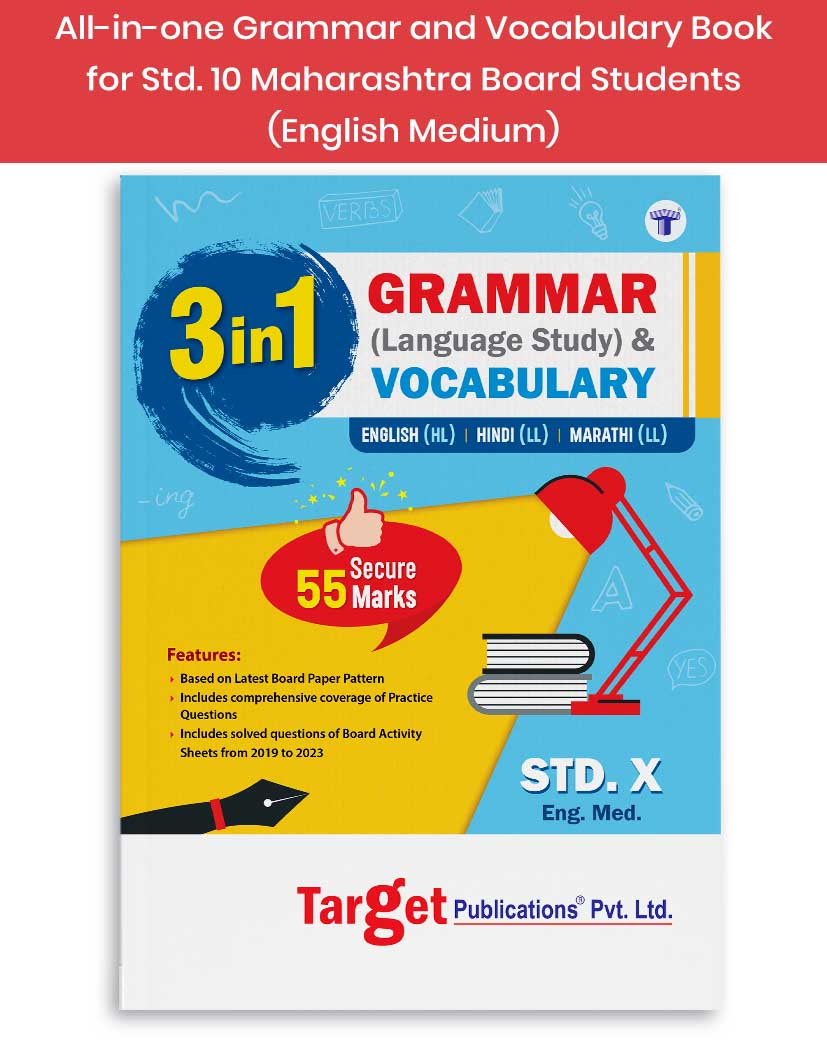The SSC Board exams are a major milestone, and it’s natural to feel a mix of excitement and anxiety. But don’t worry—you’re not alone in this journey! To help students prepare effectively, the Maharashtra State Board of Secondary and Higher Secondary Education (MSBSHSE) has shared valuable guidelines from experts on their website. These guidelines cover study techniques, time management, and exam-day strategies.
Let’s dive into the strategies that will make your preparation smoother and your confidence stronger.
Study Plan and Preparation
1. Study Cycle:
- Analyse the remaining period for the exam, then allot a fixed number of days per subject for studying, revision, and solving previous years' question papers.
2. Time Management:
- Understand the marks distribution and prioritise topics accordingly.
- Set a time limit for solving questions from each topic and practise within the given time.
3. Use of Textbooks and Notes:
- Refer to the textbooks for conceptual clarity.
- Prepare your own notes for quick revision.
- Practise solving graph, diagram, and map-based questions on a daily basis.
4. Managing Exam Stress:
- Believe in yourself and build self-confidence.
- Overcome negative thoughts by practising regularly.
Exam-Day Tips
1. Familiarise Yourself with the Exam Centre:
- Visit the exam centre before the exam day to calculate the time taken to reach it. This will help you reach the centre on time on the day of the exam.
2. Checklist for Exam Day:
- Remember to carry necessary items like your hall ticket, ID card, pens (blue/black), pencils, eraser, scale, and a water bottle. Avoid bringing prohibited or unnecessary things to the exam centre.
3. Arrive at the Centre on Time:
- Arrive on time to avoid disruptions, focus better during the test, and potentially achieve higher scores by effectively utilising the allotted time.
4. Answer Sheet Verification:
- Check if your answer sheet has proper binding and verify the page numbers on them.
- Ensure correct seat number is written in both numbers and words.
- Cross-check the bar code for the correct subject code before sticking it on the answer booklet and supplement. You can ask the respective supervisor for assistance.
5. Avoid Malpractices:
- Do not carry any copy material or engage in malpractice.
- Do not tear any pages or take the answer booklet or supplement outside the centre.
Subject-wise Tips
A. Marathi
1. Literature:
The Marathi syllabus includes 12 Gadya (prose) and 7 Padya (poetry) sections. In the exam, two paragraphs from the Gadya section are selected, accompanied by Aakalan (comprehension) activities. Additionally, four poems from the Padya section appear in the exam. Rasagrahan section of the paper focuses on the overall understanding of the poem. Pay special attention to the Sthulvachan (rapid-reading) for maximum marks. There are 4 Sthulvachan in the syllabus out of which 3 are asked in the exam along with 3 questions on it. You have to select 2 to answer to obtain 6 marks.
2. Grammar:
Samas, Shabdsiddhi, and Vakya Prachar questions collectively amount to 8 marks. There are 4 questions on Vakya Prachar in the exam paper.
3. Language Study:
Topics like Ling, Vachan, Shuddh Lekhan, Synonyms and Antonyms are important. Moreover, writing skills (letter, summary, advertisement, story, and essay) account for maximum number of marks.
B. English
1. Activity Sheet Breakdown:
In the SSC Board Question Paper for English, 40% questions are simple, 40% are of medium difficulty, and 20% are difficult questions.
2. Key Preparation Areas:
Use keywords to find answers. Practise solving unseen passages and summary writing. Focus on tense for sentence formation. Thoroughly study the textbook and previous years’ questions. Revise punctuation rules. Pay attention to usage of phrases, proverbs, adjectives, and adverbs in writing skills.
C. Hindi
1. Important Sections:
Abhivyakti questions from the syllabus are important. Practise writing Swamat (self-opinion based answer). Out of the 8 poems in the syllabus, there are 2 Bhaktikalin poems, out of which 1 will appear in the exam. From the Purakh Pathan section, comprising 4 stories and 2 poems, at least 1 poem appears in the exam.
2. Grammar and Writing Skills:
Most of the students avoid studying Vyakaran (grammar) questions, so make sure to practise answering them. Also, practise essay writing, letter writing, report writing, advertisement, and story writing. Avoid using Marathi words in Hindi, and maintain correct grammar.
D. Mathematics
1. Preparation Strategy:
Understand theorems, rules and examples. Solve all questions from practice sets and question banks.
2. Exam Strategy:
Out of the total 60 marks, aim for at least 40 marks. The exam duration for Mathematics exam is 120 minutes. This means on an average, each question should be answered in 3 minutes. Read the entire paper in the first 10 minutes to decide the priority in which you will answer the questions.
3. Time Allocation:
- Question 1 (8 marks): 24 minutes
- Question 2 (12 marks): 36 minutes
- Question 3 (9 marks): 27 minutes
- Question 4 (8 marks - HOTS): 24 minutes
- Question 5 (3 marks): 9 minutes
E. Science
1. Question Paper Blueprint:
- Question 1: 1-mark questions
- Question 2: 2-mark questions
- Question 3: 3-mark questions
- Question 4: 5-mark questions
2. Answering Strategy:
Keep answers accurate and to the point. Answer point-wise with important keywords underlined. Understand concepts thoroughly before attempting questions.
F. Social Science (History, Civics, and Geography)
1. General Tips:
Social Science is a scoring subject. Make sure to write point-wise answers. Cover all the 9 topics in the History syllabus; they have equal weightage. Do not treat any topic as optional in your study routine. In Geography, focus on map-based questions. Understand and practise solving graph-based questions such as graphs, bar charts, and line charts.
2. Exam Strategy:
In the Geography question paper, 22 marks are for objective questions and 18 marks for answer in detail. Question 4 (map-based question) and question 6 (graph-based question) are the easiest to score the most marks in. Do not skip Kshetrabhet (field visit) related questions, which require self-opinion based answers.
3. Paper Analysis
The History question paper carries a total of 28 marks, covering 9 topics, each worth 3 marks. In Civics, there are 5 topics comprising 12 marks in total, including multiple-choice questions (MCQs). For answer in detail, 6 marks are allotted. Write point-wise and structured answers.
Maintaining Health and Well-being
- Eat a balanced diet and stay hydrated.
- Get enough sleep before the exam.
- Take short breaks during study sessions.
- Engage in light exercise to stay fresh and focused.
- Stay positive and believe in your preparation.
By following these tips, you can maximise your performance in the SSC exams with confidence and ease. Best of luck!
Source
Guidance from experts on how to prepare for SSC exam, how to write answer sheets, and how to create a stress-free environment during exams, Maharashtra State Board of Secondary and Higher Secondary Education, 23 January, 2025, https://youtu.be/_nvNaSHmSww?si=o79ThsxPeR2TlSk2
Kindly note that all and any exam-related information might be subject to change as per the Maharashtra State Board of Secondary and Higher Secondary Education.
Also read
Maharashtra Board Launches the MSBSHSE App for SSC & HSC
Hall Tickets for Maharashtra 2025 SSC Board Exams Released
Maharashtra Education State Board Implements 'Copy-Mukt Abhiyaan' for SSC and HSC Students
Maharashtra State Board: New Measures for SSC, HSC Board Exams











